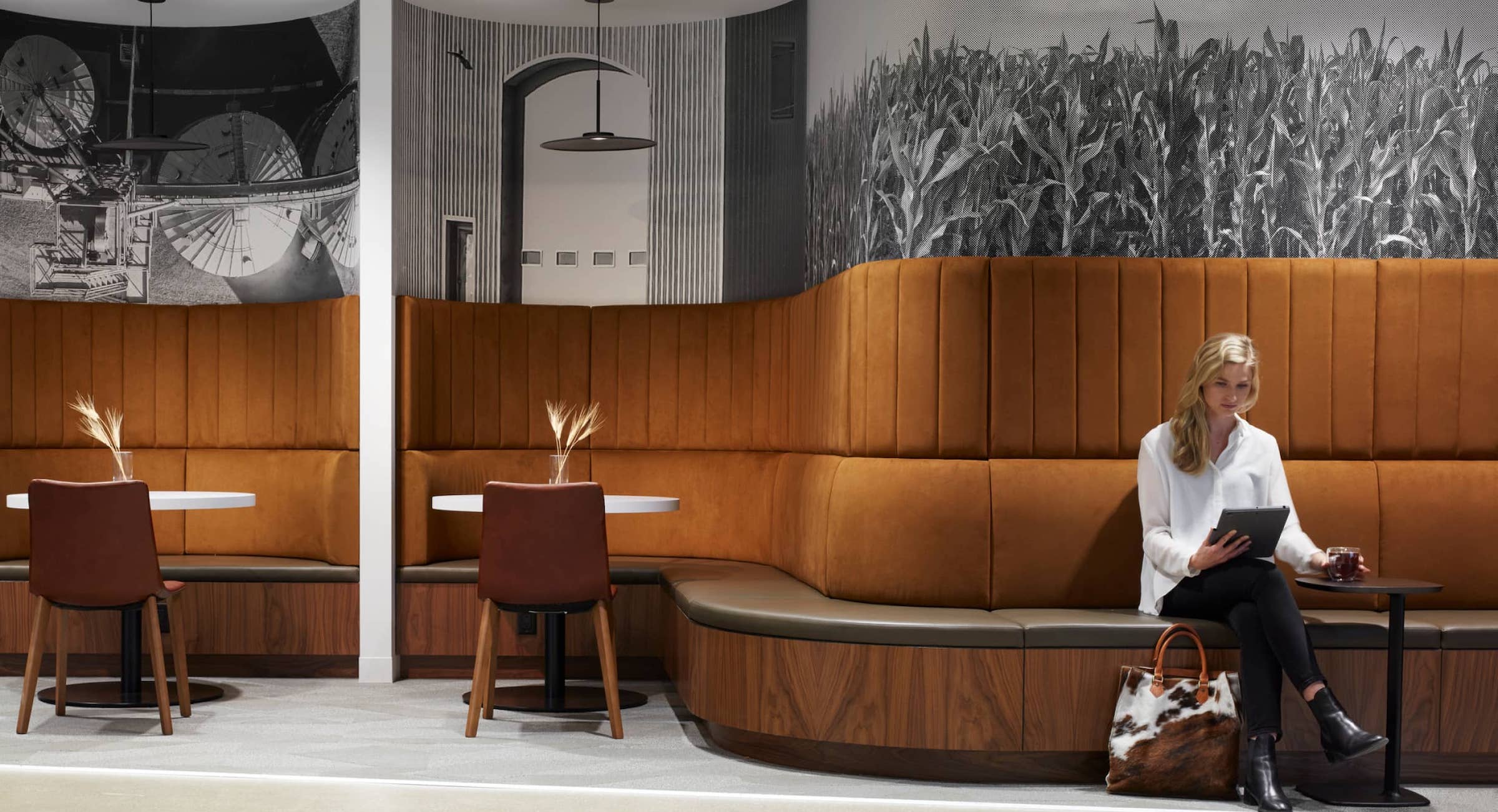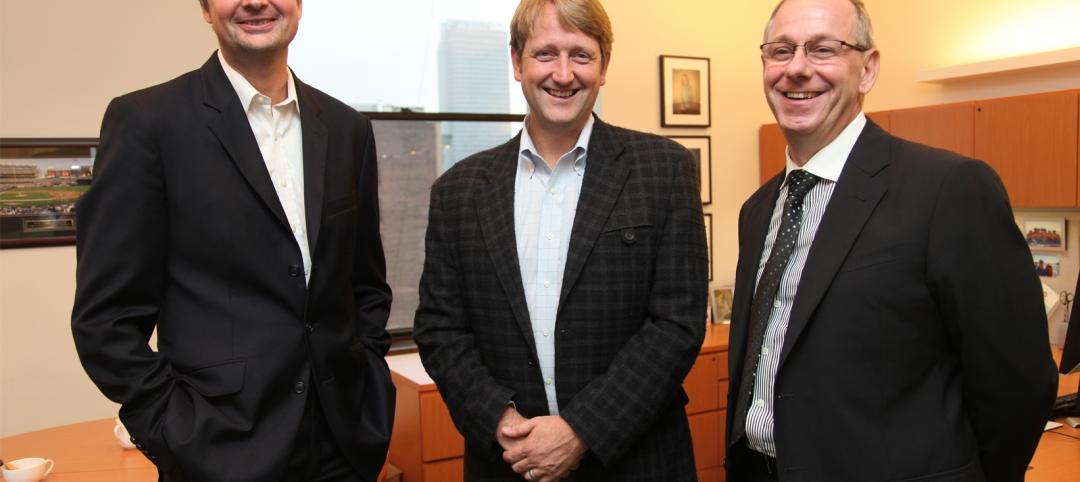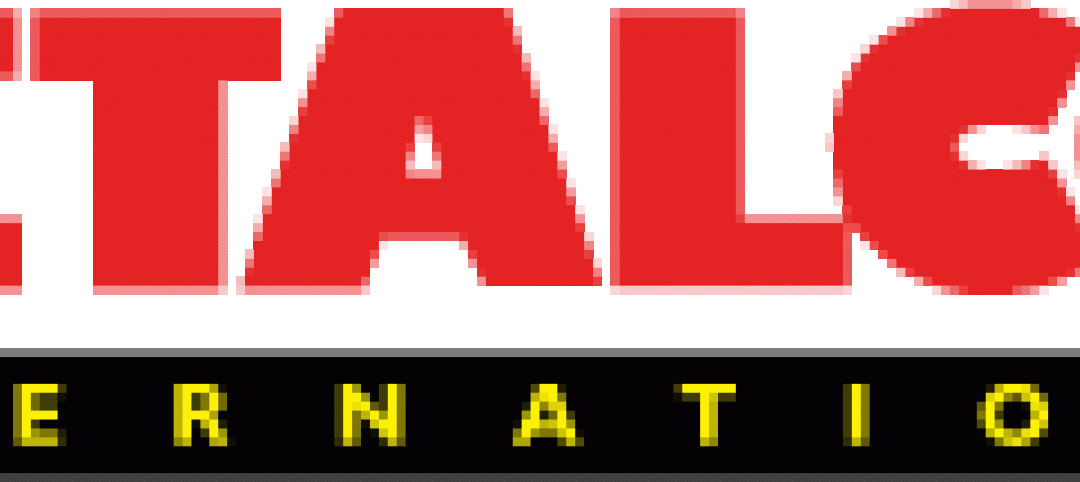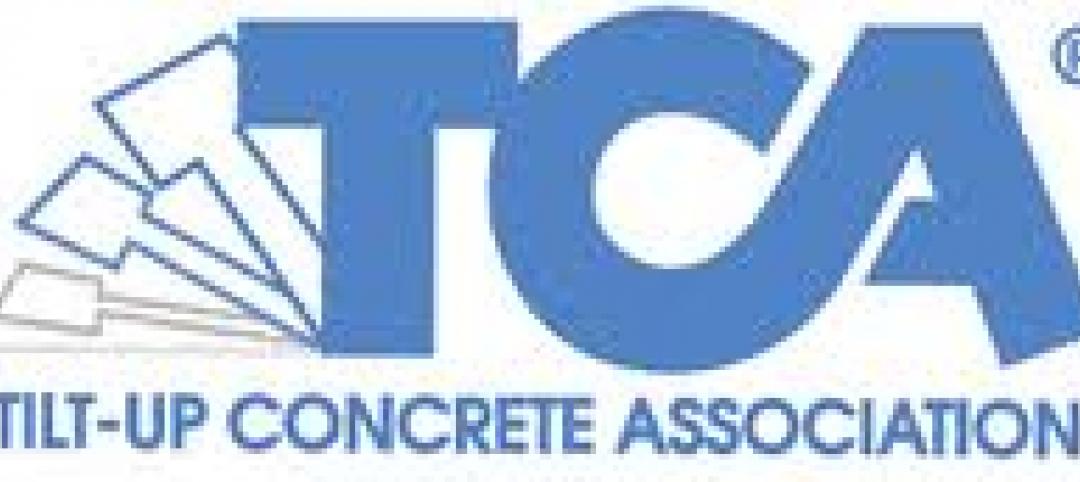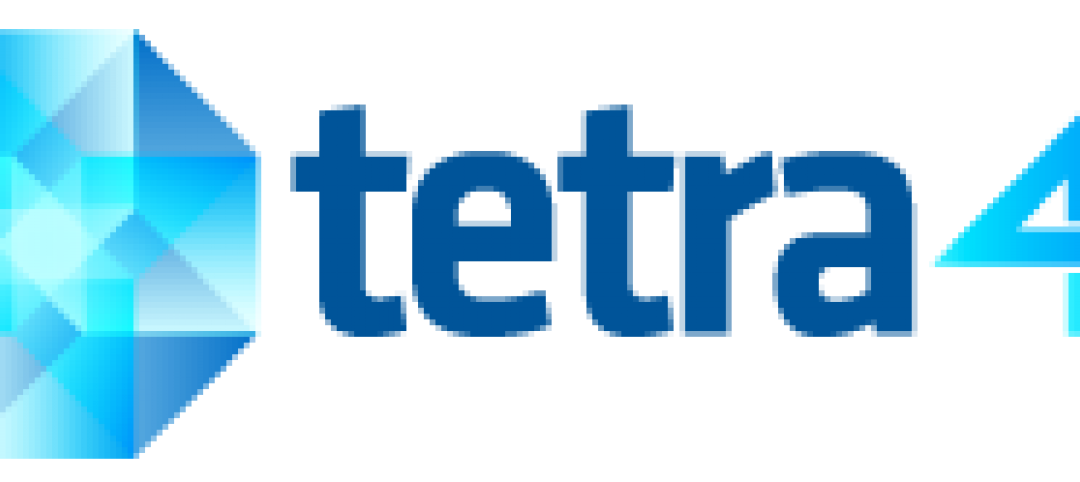Why brain health? We’ve written before about the need to embrace mental health through the prism of brain health. This emerging and growing concept encompasses neural development, plasticity, functioning, and recovery over the course of our lives.
In some ways, brain health is to mental illness what physical fitness is to disease. The current study focuses on employees—while we still have our eye on broader societal concerns, including isolation, anxiety, and various problems that come with balancing technologies in the digital age. In short, we found that brain health strategies work—those who engaged the Brain Health SMARTTM Strategies experienced a marked improvement over the course of our year-long study, as measured by the Center of BrainHealth®’s BrainHealthTM Index.
On a fundamental level, our work shifts the conversation about workplaces. HKS CEO Dan Noble says, “It’s time to change the narrative around how we work and fully leverage our brain capital. And it starts with the actions we take internally, with our own people, to help them emotionally, socially, and cognitively thrive.”
In 2021, HKS partnered with the Center for BrainHealth for a pilot program to investigate the role of place, process/policy, and technology in creating a brain-healthy workplace. The Center for BrainHealth for a pilot program to investigate the role of place, process/policy, and technology in creating a brain-healthy workplace. The Center for BrainHealth is a nonprofit research institute dedicated to advancing the science of brain health,” how the brain best learns, reasons and innovates; actionable ways to protect it from decline; and proactive protocols to repair and generate brain systems.
The organization developed a training program for brain fitness that works just like any physical fitness regime, leveraging 9 Brain Health SMARTTM Strategies that prime the brain to calibrate mental energy, reinforce strategic thinking, and ignite innovation.
The core of our research leveraged a representative sample of HKS employees who participated in the program by completing a brain health assessment, accessing training modules, and translating brain health strategies into their daily lives. Five HKS Living Labs participated during the summer of 2022, as employees returned to the office at a higher frequency as part of their flexible work experience. We captured data and insights through surveys, observations, and interviews. We also convened semi-structured gatherings with colleagues, as well as both virtual and in-person think tanks.
In all, we determined seven key findings from our year-long study. Some corroborate past studies—such as the growing need to address distractions and multitasking. At the same time, others contribute new elements to discussions on mental health. Here are a few key insights from our report (Download the full report):
- The brain can be trained. Our study showed a statistically significant increase in brain health index for individuals who went through the brain health training.1 Those that completed the core cognitive training had a higher average than those that did not.
- Managing distractions is a key challenge for focused work in the office. The office isn’t only for collaboration—workers need spaces deliberately designed for focus work. Acoustics and a lack of environmental control consistently ranked lowest in satisfaction among design elements.
- Multitasking is related to reduced effectiveness and increased burnout. Two out of five of our study’s participants said they frequently multitask—a bad habit related to a host of issues, including burnout. Our workstations are also multitasking alongside us.
- Where we work matters, and using a range of spaces helps. Creating a range of spaces based on task type or working modality may unlock innovation. We found that when participants used a range of spaces, satisfaction with collaborative work effectiveness in the office was higher.
- Digital and physical workplace habits need time to develop. Our satisfaction with individual and collaborative tasks increases with the time we spend in specific locations—we need time to acclimate to our environments for optimum efficiency.
- Being together in-person is related to improved connection to team and increased opportunities for informal knowledge sharing. Over the course of our 10-week study, collaborative behaviors increased and perceived connections to one’s team increased.
- Perceived connections to one’s team are strong, but connection to the community is lagging. After months or years of remote work, we must continuously evaluate how hybrid work arrangements impact interpersonal relationships across the organization.
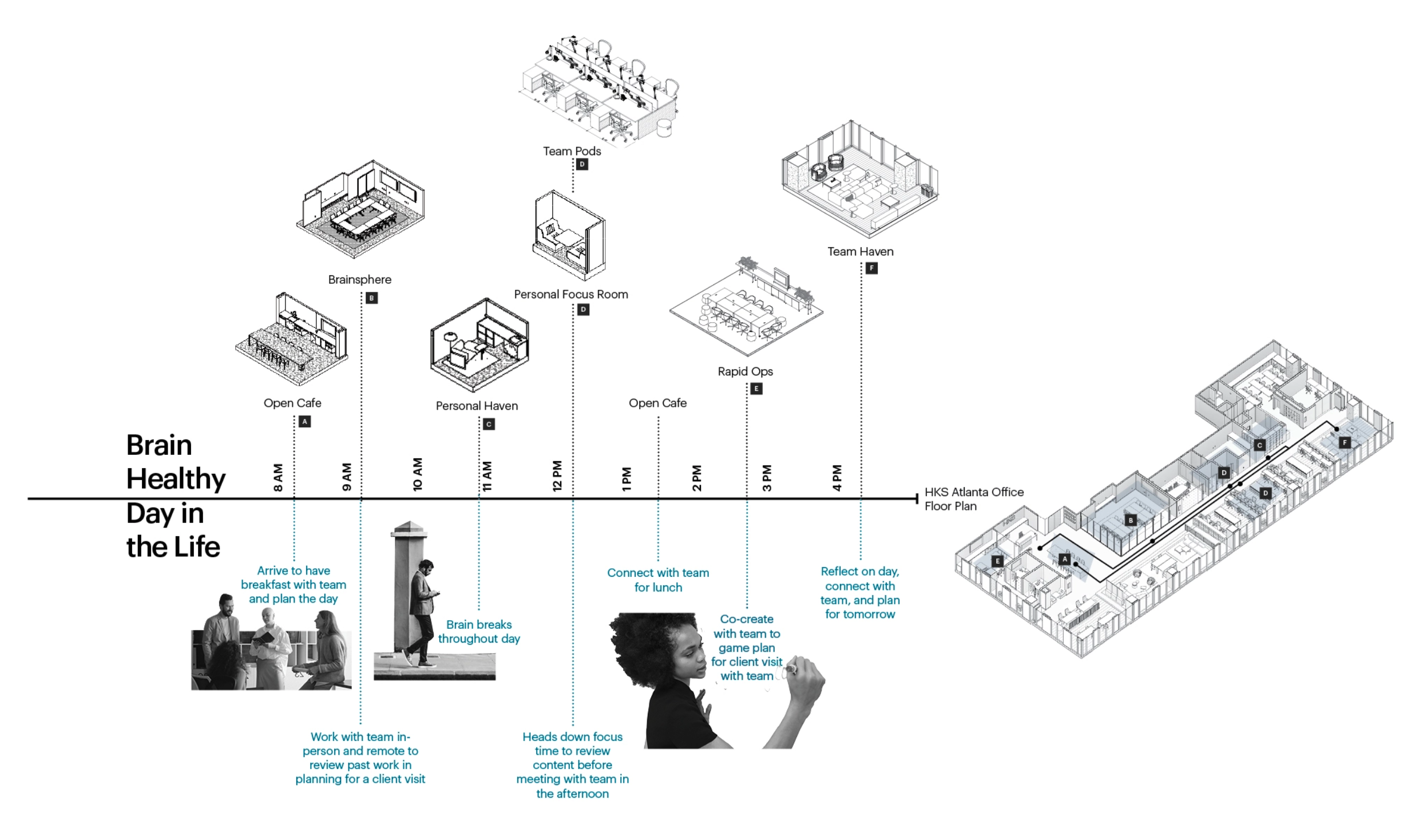
By creating workplace affordances, we translated our key findings into strategies for our work environments. Workplace affordances are how we perceive environments to meet our needs. Based on the research, we proposed five primary affordances: focus, exploration & ideation, collaboration & co-creation, rest & reflection, and social connection. Affordances denote the end goal of how users will engage an environment—but they also begin with a question. Consider—how does the workplace foster social connection and community building? Or, how does our workplace afford us the ability to focus?
We then identified three fundamental habits underpinning a workplace designed for brain health—these are our workplace ABCs. First, the intent of a task must be aligned with the chosen environment. Based on the work an employee must accomplish, they must leverage the unique digital and physical affordances available to them. We also identified that workers need balance throughout the workday. Balanced habits are about variability: working in different modalities and accessing a diversity of spaces. Finally, connection is critical to the workplace for brain health. This means connecting with others to boost a sense of belonging and provide a sense of purpose. Relating to how we align what we do with where we work and finding balance, connection also means equipping workers with the autonomy to choose and the authority to have control over their environment.
What’s next? We’re embracing the experiment: building on what we’ve gathered from our living labs and insights that we’ve gleaned from those who participated in our year-long study. We know that we’re not done yet. Our firm’s Flex Work policy is changing based on our learnings. We’re partnering with the Center for BrainHealth to develop a brain healthy workplace certification to encourage brain health practices and build accountability. We’re also focused on how our brain health explorations support unique business needs, so we’re developing a robust business case and toolkit for brain-healthy workplaces that will extend the work from this insights report into actionable real estate tools and measured impact.
Click here to download the full report
Citations:
Zientz, J., Spence, J., Chung, S. S. E., Nanda, U., & Chapman, S. B. (in review). Exploring how brain health strategy training informs the future of work. Frontiers in Psychology.
Related Stories
| Jan 9, 2012
FGM Architects acquires SRBL Architects
The firm reviewed gaps in each of the markets and identified a need in the municipal market for stronger police facility design expertise as well as additional project management and design expertise for this market.
| Jan 9, 2012
Shawmut appoints Les Hiscoe COO and EVP
In his new role, Hiscoe will focus on developing the Company’s field services divisions; national business in retail, hospitality, gaming, and sports venues; Tri-State business in academic and healthcare; sales and marketing; and human resources
| Jan 9, 2012
Thornton Tomasetti acquires green consulting firm Fore Solutions
International engineering firm launches new building sustainability practice.
| Jan 9, 2012
METALCON International 2012 announced
METALCON 2012 is scheduled for Oct. 9-11 at the Donald E Stephens Convention Center, Hall A, Rosemont, Ill.
| Jan 9, 2012
Lutron appoints Pessina president
In his 35-year career with Lutron, Pessina has acquired broad experience in the engineering, quality assurance and manufacturing areas.
| Jan 9, 2012
A new journey for KSS Architects co-founder
Kehrt's legacy of projects include Rutgers University's Biomedical Engineering Building, the renovation and expansion of Cornell University School of Hotel Administration, the recent new campus center at The Richard Stockton College of New Jersey and Princeton Township's Municipal Complex.
| Jan 8, 2012
TCA releases The Construction of Tilt-Up
The newest publication from the TCA is the second in a planned trilogy of resources covering the architecture, engineering and construction of Tilt-Up
| Jan 8, 2012
WHR Architects promotes Joel Colwell, AIA, to principal
With over 30 years of experience, Colwell has managed large-scale, complex projects for major healthcare systems as well as challenging smaller renovations and additions — all with notable success.
| Jan 6, 2012
Doug Wignall named president of HDR Architecture
HDR Architecture, Inc. is known for its award-winning designs for urban environments, campuses and buildings in the healthcare, science and technology, civic, justice and higher education markets.


